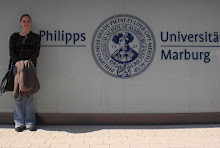 Earlier this month, I had the opportunity to celebrate another holiday in Germany: “Tag der Arbeit.” The first of May is “International Worker’s Day” (“Tag Der Arbeit” in German) and is celebrated throughout the globe (excluding the United States and Canada) as a celebration of social and economic achievements. In Germany, it is common for demonstrations, street marches and leftist party gatherings to occur on May 1. The following entry takes place in Hannover, Germany, and chronicles my experiences on and impression of “Tag der Arbeit.”
Earlier this month, I had the opportunity to celebrate another holiday in Germany: “Tag der Arbeit.” The first of May is “International Worker’s Day” (“Tag Der Arbeit” in German) and is celebrated throughout the globe (excluding the United States and Canada) as a celebration of social and economic achievements. In Germany, it is common for demonstrations, street marches and leftist party gatherings to occur on May 1. The following entry takes place in Hannover, Germany, and chronicles my experiences on and impression of “Tag der Arbeit.”Leaving the train station, I was overwhelmed by the presence of police. They rode horses, sat in big vans and stood authoritatively on street corners. The parking lot was full of them as we got into the little red Ford. Birgit explained that they were there because of a Neo-Nazi, rally and protest march that was taking place the next day.
Birgit told me that every year the Neo-Nazis rally on May 1, protesting the presence of immigrants in the country. It is their belief that immigrants take jobs away from German citizens, which is why they protest on Tag der Arbeit. I also learned that historically, Tag der Arbeit was founded by the Nazis.
Every year a new city is chosen for the protest. This year, it was Hannover’s turn. Because of my interest and my endless flow of questions, Birgit decided to take me to see the rally the following morning.
Birgit and I set off at 11 a.m. to see if the Neo-Nazi protest was going to happen illegally. It was banned the day before because of fear of violence toward citizens and property, though it was fully expected to occur as an act of civil disobedience.
We walked most of the path where the march was supposed to take place and did not see anything out of the ordinary. Part of me was disappointed (I could have slept in!). The remaining part was relieved and dared to hope that this was a sign that extremist groups, like the Neo-Nazis, could no longer exist in modern society.
Later we learned that the rally did take place behind the train station and that some violence
 did occur. However, this is not what I experienced on May 1.
did occur. However, this is not what I experienced on May 1.What I did experience was a big festival full of political speeches, music, beer and German camaraderie. This untitled fest occurs every year in Hannover and featured many kiosks from political parties (mostly from the liberal side of the political spectrum), though this year had a definite theme of diversity and tolerance and rejecting Neo-Nazi ideals. Birgit and I strolled through the booths, stopping to grab party information, buttons and postcards.
My favorite card from the day featured eight plump, delicious-looking bratwursts and said, “Braun und gut? Kann eigentlich nur eine Bratwurst sein!” meaning, “Brown and good? That can only be a bratwurst!“ Brown is the color traditionally associated with Nazism. Of course, everyone knows that Germans love their wurst.
The slogan for the festival was also “Bunt Statt Braun,” or “colorful instead of brown.” The adjective “bunt” can be used as a term for cultural diversity.
The runner up is a red postcard that reads, “Rote Karte Gegen Nazis,” or “Red card against Nazis.” Anyone that knows anything about soccer should recognize the symbolism here. A red card is a penalty card which can get a player thrown out of a match.
When I was not learning about German politics at the kiosks, I was listening to speeches. There was a stage surrounded by people waving flags and chanting “Nazis Raus!” or “Nazis Out!” Many had signs against nationalism which bobbed above the sea of people.
I saw the Minister President of Niedersachsen, Christian Wulff, give a speech about equality and diversity in Niedersachsen and how Neo-Nazi ideologies had no place in the state or the country as a whole. He publically thanked the 3,000 police patrolling the city, as well as the 15,000 people attending the festival. He received generous applause and the speeches continued. Later a reggae band from Spain took the stage and the w
 aving signs and flags were abandoned as people danced to the music.
aving signs and flags were abandoned as people danced to the music.Later reflecting on my experience at the festival, I was very happy to have gone. So often is present day Germany pinned with its past of fascism and hate. Though history should not be forgotten, too many people associate modern Germany with racism and radical philosophies concurrent with WWII. Those who fall into this category, here’s a figure for you: there were an estimated 1,000 Neo-Nazis expected to rally in Hannover May 1. An estimated 15,000 rallied against them the same day. I am proud that I was one of 15,000.
S.N.

No comments:
Post a Comment